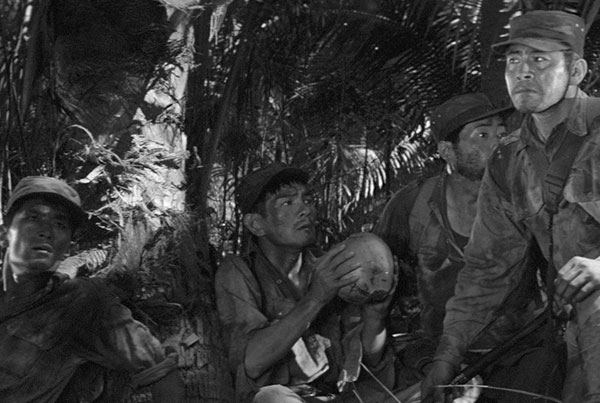L’héritage des 500 000
Treasure hunt
Cult. Toshiro Mifune’s only film, Kurosawa’s favourite actor, is an efficient thriller which slowly turns into a moral tale. A cult film never seen again since it came out in 1963.
By Michael Patin
![]() Reading time 3 min.
Reading time 3 min.
We can wonder if it’s reasonable to create an Akira Kurosawa/Toshiro Mifune cycle (11 films restored out of their 16 collaborations) only two years after the huge retrospective dedicated to the Japanese director. But here’s the thing: beyond the masterpieces we can watch again and again without being tired (from Yojimbo to Red Beard), this new program has an asset: L’héritage des 500 000, only film played, produced and directed by Mifune during his career. A completely unusual film, invisible since it came out in 1963.

A cult film never seen again since it came out in 1963
When Japan surrenders in 1945, major Matsuo leaves the Philippines after he had burried a war treasure. Twenty years later, a business man tracks him and forces him to look for the loot, with four henchmen. All the ingredients of a classic adventure film are gathered: a mythical treasure, an irreproachable hero, nasty mercenaries, a few spies at their heels, a tribe of savages, and the jungle’s and Philippines mountains’ dangers. In surface, the film conscientiously fulfills its mission of spectacle, with a preference for outside scenes which elevates it beyond a simple “série B”.
Precise and refined, Mifune’s directing doesn’t show he’s a novice, certainly because he’s inspired, in all modesty, by the director he know the best: Kurosawa. The latter incidentally helped him for the editing and “lent” him a few key members of his team: the scriptwriter Ryuzu Kikushima, the chief operator Takao Saito et the composer Masaru Sato. Difficult to mistaken with such a dream team: sharp black and white, clear cut, and the film’ musical theme – a few guitar chords- adds a persistent melancholy.
Just like his master and friend, Mifune especially takes advantage of the framework of the genre film to express his concerns as an author. Under the sheen of suspense, it criticizes the violence and cupidity that grow more and more explicitely as the characters are in their quest. If the 500 000 in the title refer to the number of gold coins buried, it’s also the number of the Japanese soldiers who died fighting during the Second World War- and then a clear reference for Japanese audience. From this analogy comes out the film’s symbolism: there is only one weapon for five men, just like there’s just one loot. The one who is going to get them, and what he will do with them, becomes the issue of this moral tale that wavers between shadow and light until the end.
- Toshiro Mifune
- Akira Kurosawa
See also
